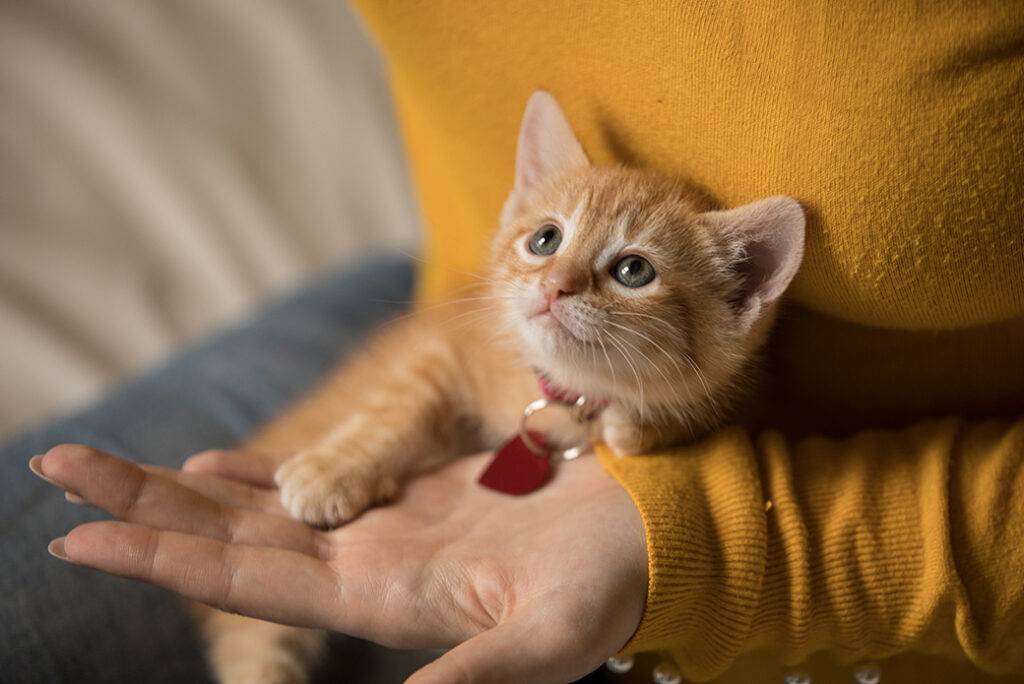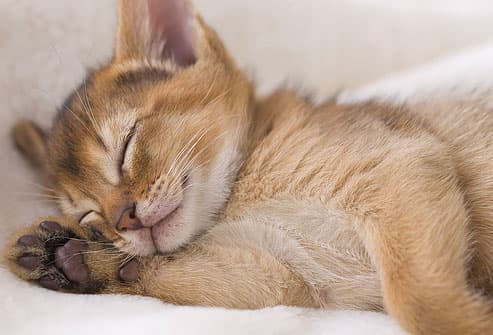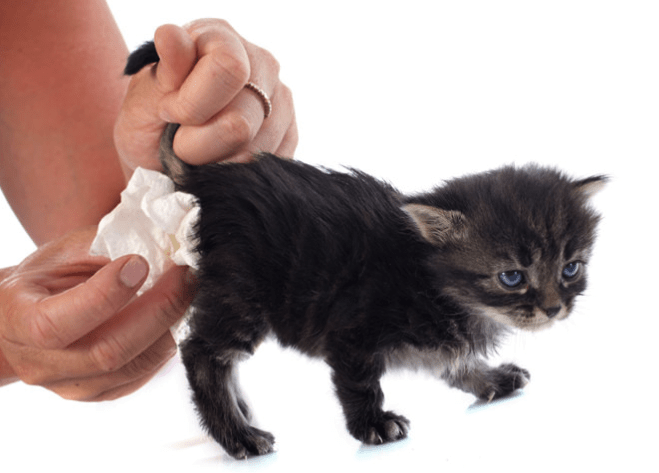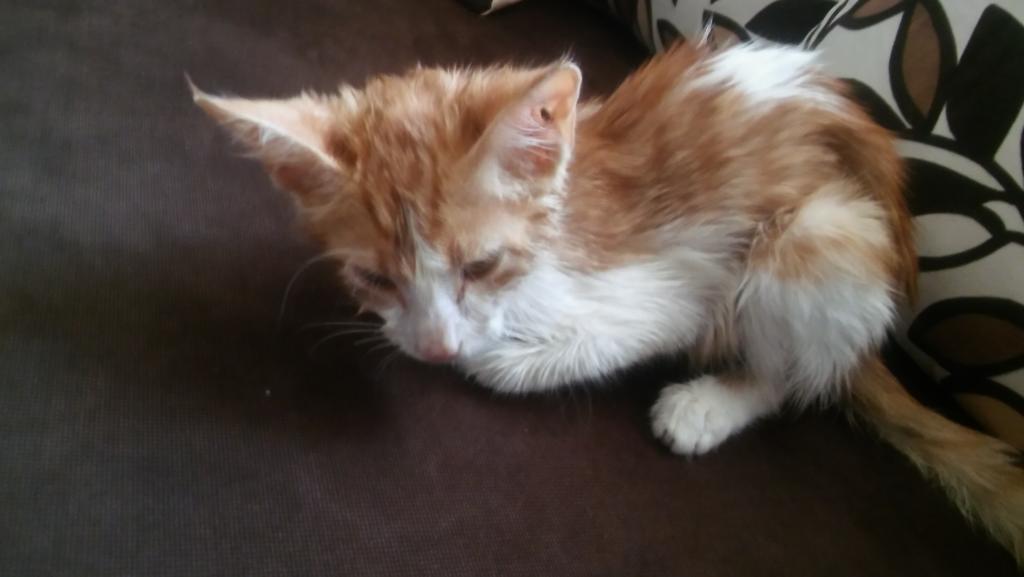As a new cat parent, you want nothing than to see that your brand new kitten is healthy and happy.
You hope and pray that she will take her formula every day and eliminate accordingly.
Well, things don’t always pan out as you wish. Your kitten can get sick, stressed, weak, and constipated. Some days she will be okay. Others… not so much.
Speaking of constipation, kittens on the bottle are notorious for it. They can go for days without passing stool for one reason or another.
This is a real nightmare both for you and the young cat. With a fragile and defenseless body, constipation can become fatal fast.
What can you do about it? We have suggested 10 remedies for you.
1. Hydration
Dehydration is undoubtedly the number one cause of constipation in kittens.
Water also supports several bodily functions including digestion, blood circulation, nutrient transportation, production of saliva, absorption, and maintaining a healthy body temperature.
Without enough water in her system, your little guy will have hard stools that don’t easily travel through the colon.
Newborn kittens primarily get their hydration from their mothers’ milk or kitten formula.
To add more water to her system, consider increasing the frequency of feeds.
If she’s on a bottle, you may want to add a kitten-safe electrolyte solution to her formula.
Talk to your vet about the right solution to use and the proper dosage.
2. Belly Massage

If you’ve cared for a newborn baby before, you probably know the benefits of a belly massage to the young one.
Whether your child is bloated or constipated, a good massage along with bicycle rides can get things going again.
The same rings true for your kitten. If she hasn’t been eliminated for over 48 hours, you might want to give her a belly massage.
Newborn kittens are tiny and fragile. When giving a belly rub, you need to be extremely careful.
Gently pick up your little girl and place her on your lap facing up.
Using only your index and middle fingers, massage her abdomen using gentle circular motions.
Repeat this for a few minutes then wait for the magic to happen. If you do it right, the massage can push the fecal matter to the anus and out.
Related Post: How Often Do Kittens Poop?
3. Nether Region Massage
Another ingenious way to help a constipated kitten pass stool is by rubbing her anus with a warm cloth.
Mother Nature has taught pet parents this amazing trick. Mother Cats are famous for licking their kitten’s nether regions to stimulate them to eliminate. This is because newborn kittens don’t have a mechanism for passing stool. They need to be taught to do so.
If mommy is not in the picture, it is up to you to take up the mantle.
Simply grab a soft piece of cotton cloth or a cotton ball and some warm water.
Dip it in the water then rub your kitten’s anus in circular strokes.
Be as gentle as you can because the area is very delicate. Keep going until the kitten poops.
Doing this is no mean feat. You risk being splashed with cat poop. The very act can be very disgusting.
However, if your fur baby needs your help, you have no option but to get your hands dirty.
Look for a good pair of leather gloves and an apron and get to work.
4. Deworming
With weak immune systems, kittens are perfect candidates for all kinds of worms.
Among the most notorious parasites include roundworms and hookworms. These gain entry to your pet’s digestive system blocking the movement of food and waste.
In severe cases, the worms can perforate the intestinal lining and cause major leaks and blood loss.
Luckily, a good dewormer is enough to take care of this problem.
If your kitten hasn’t been dewormed for roundworms, now would be a good time to do it.
Go to the vet and bring this up with them.
5. Check The Formula
Your kitten’s diet is a huge contributor when it comes to constipation.
Breast milk is always recommended as it comes from the source. Chances of contamination are nil. The milk is also made for the kitty’s body and will not harm her (unless it carries worms, of course).
Else, if your kitten is on the bottle, many things can go wrong. The risk of contamination during preparation and feeding is very high.
Additionally, some people use formulas made for other animals and not kittens. If you use anything else except kitten-specific formula, your feline friend may have digestive issues.
To be safe, make sure you use the right formula for kittens and keep high standards of hygiene.
6. Keep The Kitten Calm

Like adult cats, kittens get stressed quite easily. A change in their feeding schedules, moving to a new house and loud sounds can make them very anxious.
Anxiety doesn’t only affect the emotional health of your kitty. It is directly linked to her elimination habits as well. If your pet is too stressed, she can get constipated.
To calm a stressed kitten, provide a cozy and warm space for her. Keep it as quiet as possible.
Desist from holding her all the time. Let her rest from time to time.
If possible, allow only one handler for now. Let her get used to them until the stressful period is over.
If nothing works, ask the vet what to do. They might prescribe anxiety medications for kittens.
7. Warm water bath
The anal sphincter muscles can contract and block poop from passing through in a normal manner.
Warm water can help relax them thus releasing trapped stool.
Simply get a basin with warm water and bathe your kitten for around five minutes.
You might want to gently massage her anus during the bath to relax the muscles.
Don’t keep her in there too long as she might get hypothermia.
8. Kitten-safe laxative
A laxative is a product used to soften stools so they can easily pass through the colon.
It possesses agents that increase the bulk, motility, and frequency of stool thus relieving constipation.
Some lubricate the intestinal wall while others hydrate the stool so it can travel without any hassle.
When it comes to using laxatives around kittens, err on the side of caution.
Don’t buy over-the-counter medications. Let an expert prescribe the right product based on the symptoms of your kitten.
You may need to take her to the clinic for tests before the vet prescribes the laxative.
9. Enema
Sometimes all the above remedies fail to relieve constipation symptoms in your kitty.
In this case, the kitten will need extreme methods of treating the problem.
Giving an enema is one of the effective methods of forcing feces out of your kitty’s system.
Here, the vet will inject a special liquid into her rectum. The liquid adds water into the hard stool making it soft and easy to pass through.
It also lubricates the rectum so that stool can easily glide through it.
Enemas come in different types. There are those with glycerin and those without it.
Pure warm water and mineral oils can also be used to soften stools. You might want to speak to your vet to know the right one to use.
10. Manual Removal Of Feces

Although it doesn’t happen often, a constipated kitten may also require manual removal of fecal matter to ease constipation.
If none of the strategies above work, the vet may resort to getting rid of stools manually.
First, they will put your kitten under general anesthesia then they will go in with specialized tools to remove stool.
In addition to treating constipation, the vet will recommend a lasting solution.
Parting Thoughts
There you have it – 10 newborn kitten constipation remedies.
Clearly, most of these can be done at home. If you are not comfortable performing any of them or are seeing no success for your efforts, go to the experts.
Constipation can be fatal if nothing is done in time.

Hi! I am Eleanor Price. I started this website after my cat, Louie, almost died from a case of botulism (a type of food poisoning often caused by bacteria that grow on food items). Turned out that my cat’s diet was the problem. I have made it my duty to provide the best information and recommendations about everything cat lovers need to know about their felines’ health and wellbeing. My goal is to find the most informative content on anything feline-related and share it with fellow hardworking kitty lovers.

